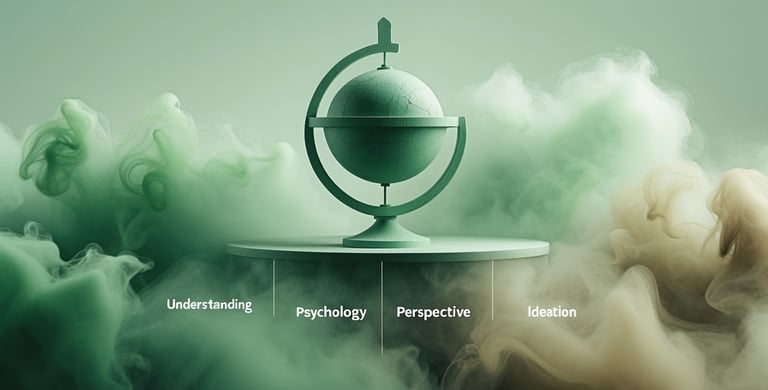First-Person Intelligence for a Third-Person World
Husserl's Rifle Scope – How to Weaponize Direct Experience Against Conceptual Fog
4FORTITUDEU - UNDERSTANDING, COGNITION, PSYCHOLOGY, PERSPECTIVE
First-Person Intelligence for a Third-Person World
Husserl's Rifle Scope – How to Weaponize Direct Experience Against Conceptual Fog
"To the things themselves!" — Edmund Husserl, Logical Investigations, 1900-1901.
Introduction
In the cluttered haze of a home workshop on July 15, 2025, a man stands alone amid scattered tools and screens blaring conflicting narratives—AI ethics debates, climate policy clashes—clouding judgment with third-person abstractions. He confronts the fog of conceptual overload, where direct senses drown in ideological filters, and deploys Husserl's rifle scope: bracketing assumptions through epoché to target raw phenomena, storming essences via eidetic reduction, and surveilling horizons for experiential boundaries, lest cultural suppressors mute the sniper's epistemology of pure perception.
Concrete as the unfiltered grip on a hammer's weight defying theoretical blueprints, symbolic as the scout's lens piercing mist to reveal terrain unadorned, philosophically echoing Marcus Aurelius' call to perceive reality stripped of opinion's veil, spiritually invoking the Creator's direct encounter as in Moses' burning bush—this wrestle endures unresolved: bracket to behold the things themselves, or succumb to conceptual fog's disorienting siege?
For the guardian-husband, this operator demands existential clarity, tied to fatherhood's transmission of unclouded discernment, survival through first-person intelligence in an era of memetic pollution where disinformation warps third-person views, and legacy's guard via drills that weaponize perception against contamination. Anchored in Aristotle's empirical observation as virtue's foundation, refined by direct engagement, and Laozi's Tao where perception flows uncarved to the essence—yet mystically, Sufi witnessing of the divine without intermediary echoes, framing phenomenology as ongoing discovery in liminal scopes between fog and focus.
Core Knowledge Foundation
Phenomenology, founded by Edmund Husserl, is the study of structures of consciousness as experienced from the first-person view, emphasizing intentionality—the directedness of experience toward objects [plato.stanford.edu brown.edu].
Etymologically, "phenomenology" derives from phainomenon (appearance) and logos (study), focusing on how things appear in experience. Historically, Husserl's Logical Investigations (1900–1901) introduced zu den Sachen selbst ("to the things themselves"), urging a return to direct phenomena beyond abstractions [plato.stanford.edu].
Epoché, the bracketing of assumptions about existence, suspends the natural attitude to focus on pure experience, countering conceptual fog by isolating phenomena as they present themselves [iep.utm.edu]. Eidetic reduction varies features to grasp invariants—the essence (eidos) of phenomena—storming core structures amid variability [plato.stanford.edu].
Intentionality ensures consciousness is always "of something," locking focus with armor-piercing precision on noema (object as intended) and noesis (act of intending) [plato.stanford.edu]. Horizon encompasses implicit backgrounds, surveilling 360° for contextual boundaries that shape appearance [plato.stanford.edu].
Phenomenologically, this manifests as first-person firewalls against third-person ideological contamination, debunking naïve realism; instead, bracketing reveals pure perception, as in modern psychology applying phenomenology to decision-making in high-stakes environments where direct experience cuts through fog [tandfonline.com journals.sagepub.com].
Metaphysically, it probes existence's appearance—does bracketing unveil divine essence? The uncomfortable truth fractures: unbracketed assumptions breed epistemic pollution, yet discovery unfolds, spiritually as Scripture's "behold" commands direct gaze beyond veils.
Theoretical Frameworks & Paradoxical Anchors
Husserl's sniper epistemology brackets the natural attitude, tying masculine duties to perceptual clearance under ideological siege—epoché suspends cultural suppressors, enabling zu den Sachen selbst as targeting system [iep.utm.edu].
Jungian archetypes surface: the perceiver integrating shadow distortions, where unstormed essences fragment focus. Taoist harmony aligns intentionality drills; wu wei locks onto phenomena without force, maintaining horizon surveillance.
Transcendent-paradoxical anchor: Socrates' examined life fused with Zen's direct pointing—paradox: bracket to behold, eidetic storming revealing essence amid variability [plato.stanford.edu], crossed with Stoic unclouded perception.
The gap persists: theory's first-person firewalls versus action's third-person fog, compelling intuition's dual—cognitive reduction and divine whisper—to weaponize experience, leaving resonance unresolved: clear the suppressor, or fire muffled shots?
Advanced Insights & Reversals
Inversions reveal: verification's demand captures less, reversing into paradox where transformative phenomena resist—Husserl's epoché inverts natural attitude, weaponizing bracketing against fog [partiallyexaminedlife.com].
Archetypes warn—the fog-bound scout misses horizons; intentionality drills invert distraction into piercing focus, as modern applications in psychology breach conceptual barriers for high-stakes clarity [tandfonline.com].
Eidetic SWAT inverts variability into essence capture, storming phenomena's core [plato.stanford.edu].
Contradiction: "Fog to focus; reduce to reveal," probing Nietzsche's perspectivism amid appearances, spiritually as visions pierce veils, yet tension haunts: does operator's scope dominate reality, or tempt solipsistic reversal?
Hidden truths: Phenomenology's reduction clears ideological suppressors, per modern decision-making where direct experience counters contamination [tandfonline.com] [simplypsychology.org], fostering perceptual sovereignty.
For operators, this instills justice: unbracketed fog perverts truth, mirroring trends polluting epistemology.
Critical Perspectives & Ethical Crossroads
Steelman third-person institutional views: anchor in verifiable consensus against subjective delusion [brown.edu].
Yet, first-person operator counters with direct targeting; shunning epoché flattens to fogged shots. Wisdom warns of abstracted poverty; heed for perceptual clearance.
Duality: Vow the bracket, or languish veiled.
Crossroads: allegiance to phenomenological operator, from struggle—no superiority, only the forge of focus.
Embodiment & Transmission
"What must be done—by the hand, the tongue, or the bloodline."
Embody via daily clearance drills: bracket assumptions, reduce eidetically, surveil horizons, invoking Husserl's call, bridging intentionality through contradiction—discover scope in phenomena's lock, not fog's drift.
Final Charge & Implementation
Workshop clears, scope aligns, transfigured—activate the phenomenological operator.
Bold actions:
Bracket daily, Aurelius-guided.
Reduce weekly, Laozi-aligned.
Sacred actions, drills, practices:
Perceive dawnly, building fitness through Stoic clearance.
Storm essences, modulating readiness.
Teach operations orally, fostering teaching endurance.
Focus intentionally technically, honing skills.
Pray direct nightly, tying to bonds.
Surveil horizons, sharpening defense.
Journal breaches, promoting understanding.
Share drills altruistically, ensuring justice.
Study classics weekly, aligning wisdom.
Transmit manual to kin, sealing legacy.
Sacred question/paradox: In phenomena's scope, where does experience fracture—or direct redeem?
Call-to-Action: Launch one drill; target your realm.
Remember: Operate phenomenologically, unbroken.


